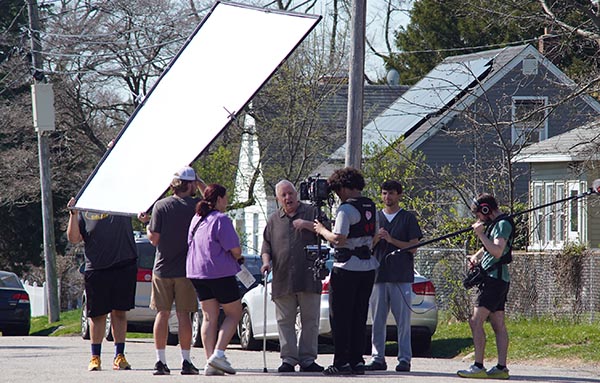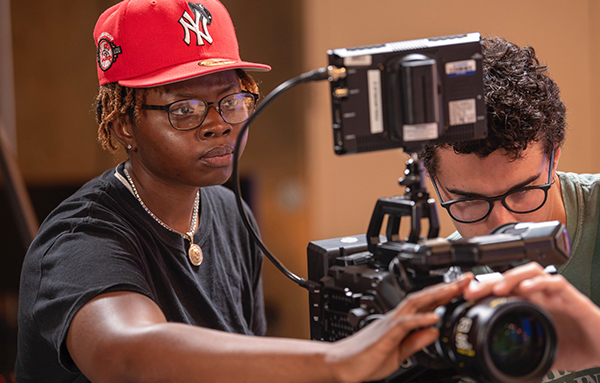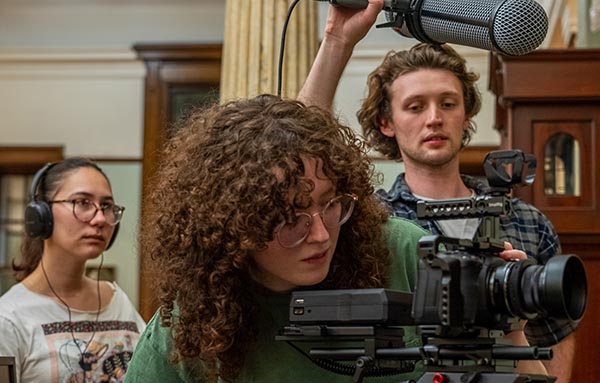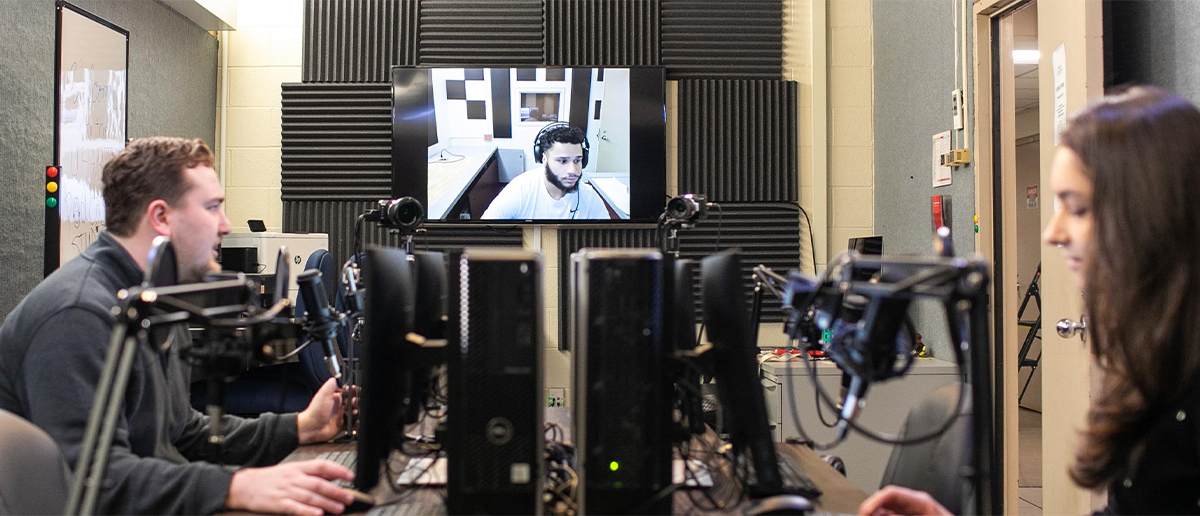
Communication - BA
In the Bachelor of Arts in Communication program, you create advertising, public relations, and social media campaigns for real clients, all while learning how to effectively communicate with different target audiences.
As a cinema student, you will study the art of filmmaking and create your own films using the latest technology and collaborate with faculty and peers on professional sets. Cinema majors develop the skills they need to work professionally in the film and media production industries. There are opportunities to present at film festivals, study abroad, and get additional experience through internships or networking in Connecticut, New York, or Boston.
Cinema students work in our production studio and editing labs that feature industry standard technology. There are opportunities to present work at film festivals, collaborate with our award-winning faculty on professional sets, study abroad with department faculty and students, and get additional experience through an internship at a production company or network in Connecticut, New York, or Boston. Cinema students can also choose an accelerated 3+1 Cinema BA and MBA option that allows them to graduate in four years with both a BA and MBA.
You can watch UHart student films at vimeo.com/hartfordcinema

As a cinema major, you’ll study the art of film and develop the technical skills you’ll need to produce and direct your own work. Cinema majors select courses that match their interest in narrative filmmaking, documentary, animation, experimental film, and/or film studies. Our majors graduate having made several of their own films that they submit to film festivals and screening venues. You will learn both the technical skills and the critical thinking skills you’ll need to be well prepared to work in film production, television, advertising, marketing, and corporate media production fields. Cinema students have 24-hour access to Mac and PC workstation editing suites running Adobe Creative Cloud and Davinci Resolve and use industry standard professional cinema cameras, cinema lenses, and all of the necessary accessories to make professional films: like light kits, dollies, cranes, and audio production accessories.
Here you can also take advantage of opportunities to study film abroad with department faculty or get additional experience through an internship at a production company in Connecticut, New York, or Boston. Our students graduate having directed several of their own films and they have the skills necessary to succeed in the workplace.
Our alumni in film/video production have gone on to work at television networks, in commercial advertising production, and film production companies as directors, producers, and editors. Our alumni in cinema studies have gone on to become critics for major news organizations and directors of international film festivals. Our students have also gone on to complete graduate work in filmmaking at University of Southern California, New York University, Columbia University, Yale University, and Chapman College.
A total of 37-39 credits are required for the Bachelor of Arts in Cinema program.
The cinema major has two possible tracks: Cinema Studies and Film/Video Production.
All cinema majors take six courses (19 credits) in both film/video production and cinema studies that are divided into three groups: Introduction, Grounding, and Experiential Learning. The rest of the courses are taken in the track the student selects, either cinema studies or film/video production.
You start off with both an Introduction to Film course and an Introduction to Filmmaking course, which provide an overview of film studies concepts and film/video production skills. You then take courses from two categories to build upon your knowledge and understanding of film. The experiential learning category gives you the chance to work on a senior project film or video project over the course of the semester.
Select three courses from the Grounding category such as:
Storytelling for the Screen
Film History
Film Analysis
Select one course from the Experiential Learning category:
Producing and Directing
Advanced Production Workshop
For more information, and to see a complete list of degree requirements, visit the Course Catalog.
You decide how best to complete the major.
You can select courses in the Film/Video Production Track or Cinema Studies. You take six additional credits (18 -19 credits) in the track of your choice, examples include:
Film/Video Production:
Cinema Studies:
For more information, and to see a complete list of additional degree requirements, visit the Course Catalog.
A total of 15 credits is required for the minor in cinema including the core course, Introduction to Film.
In addition, two of the following courses are required from the Grounding category.
You also select two courses from the Study in Depth category:
For more information, and to see a complete list of minor requirements, visit the Course Catalog.
Bachelor of Arts in Cinema students will:

A 3+1 BA in Cinema and MBA program is also offered. You take your undergraduate cinema courses in the College of Arts and Sciences, and Master of Business Administration requirements in UHart’s Barney School of Business. By the end of your third year, you will have completed the BA in Cinema and minor in Business, and by the end of your fourth year, you will have completed the MBA. This accelerated program allows you to finish both degrees in the same amount of time it would normally take to finish one, and at a reduced cost.
3+1 Program Information
If you have questions about the program and course schedule, contact Cinema Program Director and Associate Professor Lauren Cook at lcook@hartford.edu.

Cinema majors have 24-hour access to several editing labs with PC and Mac studio workstations running Adobe Creative Suite and Davinci Resolve. There are specialized workstations for stop motion animation, rotoscoping, and color correction. Students also have access to our TV/Film Studio with professional lighting grid for their projects. They can record in our audio production booth and podcast studio that is equipped for live podcast feeds with video and audio.
Cinema students use industry standard cinema cameras (Blackmagic URSA, Pocket 6k Pro, Sony DSLRs, etc.) and production equipment to shoot their class projects. They also have access to professional-grade lighting kits, dollies, cranes, and audio equipment. Cinema studies classes and film club screenings take place in our theater screening classroom with stadium seating, Dolby surround sound, and 4k projection.

The Cinema program offers study abroad classes with department faculty over Spring Break where students study the films and culture of the country/region and produce media work. Previous locations include: Argentina, Prague, and Vienna. In spring 2026, students will travel to Morocco with Assistant Professor of Cinema Dakota Nanton. They will produce media while traveling throughout Morocco to cities like Marrakesh, Fez, and Tangiers. They will also study the rich history of the region’s cinema and culture. Our students can also opt to study film and media abroad for a semester in locations like South Korea, Prague, London, or France.
Cinema, '23
Leo Caserta ’23 is well on his way to fulfilling his dream of becoming an independent filmmaker, having already completed a portfolio that earned him a Creativity Award from UHart’s School of Communication. Leo has worked as a crew member on a couple of Lifetime films, as well as an interview with Ultimate Fighting Championship (UFC) martial artist Alex Pereria at ESPN and a Gatorade commercial with UCONN women's basketball player Paige Bueckers.
Leo says UHart Cinema Instructor Zachary Haines provided him with tremendous support during his time at UHart. Read more.
UHart has a good film program with a good base in both theory and basic production skills, however, nothing beats real experience. I wouldn’t be where I am right now without the jobs I’ve worked over the past two years.
MA in Communication, BA in Cinema, and Digital Media and Journalism, '20, M'22
Kyle has accepted a position with NFL Films to work on HBO’s Hard Knocks, a reality sports documentary series that focuses on a new NFL team each year. Kyle had also been offered a job editing game footage for Major League Baseball, but decided on the NFL Films position because it lined up with what he wants to focus on, which is documentary filmmaking.
His latest documentary, Gay Spirit Radio: Not Afraid to be Different—The Keith Brown Story, will be shown as the centerpiece of Connecticut’s LGBTQ Film Festival in June. The documentary details the history of the Gay Spirit Radio program on UHart’s WWUH radio, which has been hosted Keith Brown for more than 40 years.
My professors made me feel comfortable taking risks since I'm in a unique field of editing and production. The small class sizes made me feel like I had a connection with every professor. The projects and papers were meaningful, and I feel well prepared to enter the workforce.”
Gavin Mealey '20, CinemaThe skills you'll learn in the program will be valuable when it comes time to go out into the workforce. What is equally valuable though, are the connections you'll make while you're here.

In the Bachelor of Arts in Communication program, you create advertising, public relations, and social media campaigns for real clients, all while learning how to effectively communicate with different target audiences.

Our digital media and journalism degree prepares you for a career in digital media production, broadcast journalism, sports media, or as a media business professional.